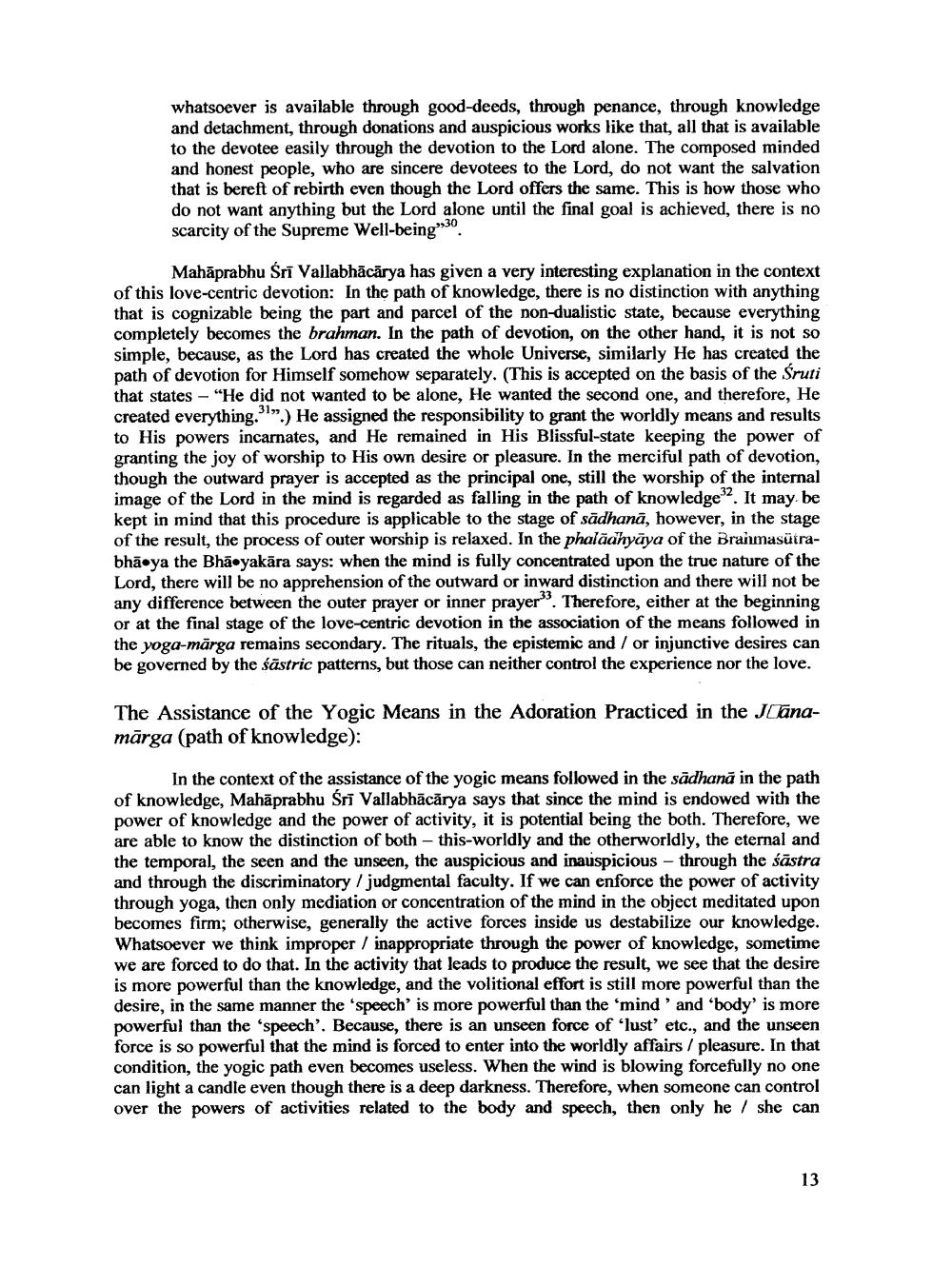________________
whatsoever is available through good-deeds, through penance, through knowledge and detachment, through donations and auspicious works like that, all that is available to the devotee easily through the devotion to the Lord alone. The composed minded and honest people, who are sincere devotees to the Lord, do not want the salvation that is bereft of rebirth even though the Lord offers the same. This is how those who do not want anything but the Lord alone until the final goal is achieved, there is no scarcity of the Supreme Well-being".
Mahāprabhu Sri Vallabhācārya has given a very interesting explanation in the context of this love-centric devotion: In the path of knowledge, there is no distinction with anything that is cognizable being the part and parcel of the non-dualistic state, because everything completely becomes the brahman. In the path of devotion, on the other hand, it is not so simple, because, as the Lord has created the whole Universe, similarly He has created the path of devotion for Himself somehow separately. (This is accepted on the basis of the Sruti that states - "He did not wanted to be alone, He wanted the second one, and therefore, He created everything."'".) He assigned the responsibility to grant the worldly means and results to His powers incarnates, and He remained in His Blissful-state keeping the power of granting the joy of worship to His own desire or pleasure. In the merciful path of devotion, though the outward prayer is accepted as the principal one, still the worship of the internal image of the Lord in the mind is regarded as falling in the path of knowledge. It may be kept in mind that this procedure is applicable to the stage of sādhanā, however, in the stage of the result, the process of outer worship is relaxed. In the phalāahyāya of the Branmasutrabhāeya the Bhāeyakāra says: when the mind is fully concentrated upon the true nature of the Lord, there will be no apprehension of the outward or inward distinction and there will not be any difference between the outer prayer or inner prayer. Therefore, either at the beginning or at the final stage of the love-centric devotion in the association of the means followed in the yoga-mārga remains secondary. The rituals, the epistemic and / or injunctive desires can be governed by the śāstric patterns, but those can neither control the experience nor the love.
The Assistance of the Yogic Means in the Adoration Practiced in the Jlanamārga (path of knowledge):
In the context of the assistance of the yogic means followed in the sādhanā in the path of knowledge, Mahaprabhu Sri Vallabhācārya says that since the mind is endowed with the power of knowledge and the power of activity, it is potential being the both. Therefore, we are able to know the distinction of both - this-worldly and the otherworldly, the eternal and the temporal, the seen and the unseen, the auspicious and inauspicious - through the śāstra and through the discriminatory / judgmental faculty. If we can enforce the power of activity through yoga, then only mediation or concentration of the mind in the object meditated upon becomes firm; otherwise, generally the active forces inside us destabilize our knowledge. Whatsoever we think improper / inappropriate through the power of knowledge, sometime we are forced to do that. In the activity that leads to produce the result, we see that the desire is more powerful than the knowledge, and the volitional effort is still more powerful than the desire, in the same manner the 'speech' is more powerful than the 'mind' and 'body' is more powerful than the 'speech'. Because, there is an unseen force of 'lust' etc., and the unseen force is so powerful that the mind is forced to enter into the worldly affairs/ pleasure. In that condition, the yogic path even becomes useless. When the wind is blowing forcefully no one can light a candle even though there is a deep darkness. Therefore, when someone can control over the powers of activities related to the body and speech, then only he / she can




